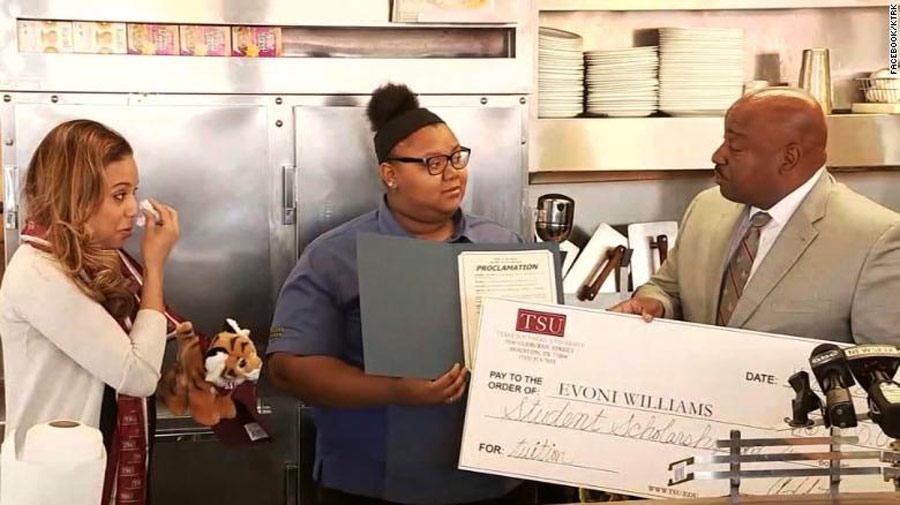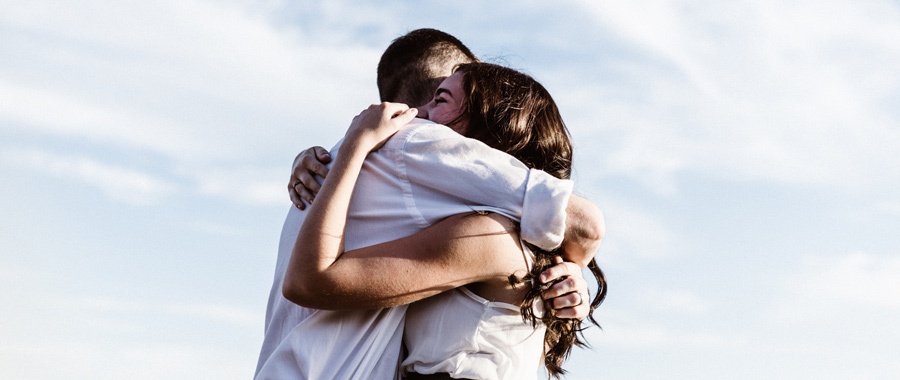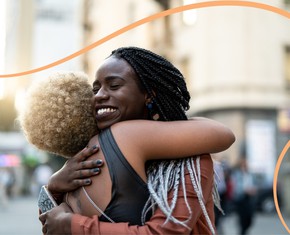The views expressed in our content reflect individual perspectives and do not represent the authoritative views of the Baha'i Faith.
One February day in 2018, Evoni Williams worked another shift at a Texas Waffle House – and one good deed changed the life of this 18-year-old high school graduate trying to save money to go to college.
The chain of events that propelled Evoni’s life into a fairytale story started when Adrian Charpentier walked into the restaurant for breakfast. This regular customer shuffled across the floor, pulling an oxygen tank on wheels and slowly dragging himself up on a front-counter chair to order his meal.

When his ham and eggs arrived, Adrian quickly realized he had no coordination or strength in his hands due to a recent surgery. He let Evoni know he needed help, and asked if she would cut the meat for him. Though it was an extremely busy morning, without hesitation and with a smile on her face, she complied with her customer’s request.
Laura Wolf was having breakfast at the Waffle House when she overheard the older man, who reminded her of her father. Evoni’s spirit of service at work impressed Laura, a mother of four. “A rare occasion to witness,” Laura thought, so she retrieved her smartphone from her purse and recorded the episode.
Evoni’s kind act that day, based on faith and knowledge, reflected these two foundational aspects of her upbringing, as explained by the Baha’i teachings:
… a soul of excellent deeds and good manners will undoubtedly advance from whatever horizon he beholdeth the lights radiating. Herein lies the difference: By faith is meant, first, conscious knowledge, and second, the practice of good deeds. – Abdu’l-Baha, Baha’i World Faith, p. 383.
Later that day, after Laura uploaded the video on Facebook, Evoni was flooded with notifications. Her friends had tagged her and shared the message seventy-three thousand times. The news about her act of kindness spread through social media like ripples in a pond. The post went viral. Newspapers and TV stations picked up the story. Evoni became an instant celebrity. Everyone in La Marque, Texas talked about it. The town’s mayor, Bobby Hocking, heard about the good deed and immediately felt he should do something for Evoni, so he declared March 8 as “Williams Day.”
The buzz on social media and in the news about Evoni Williams’ generous act caught the attention of Texas Southern University President Austin A. Lane. He offered Evoni a $16,000 scholarship. “We wanted to reward Evoni’s act of kindness and let her know that good deeds do not go unnoticed,” said Melinda Spaulding, an administrator at Texas Southern University.
More blessings poured in. Evoni did not have a car to get to classes, so some people came forward and started a GoFundMe page for her.
Her one act of kindness echoed in the chamber of many hearts in La Marque, a town known for diversity and harmony, whose demographic includes a diverse spectrum of whites, African-Americans, Native Americans, Asians, Hispanics, and many other ethnic backgrounds and cultures. Evoni, an African American, and Adrian, a white man, had connected with each other as a result of one kind act, and their connection gave the entire town reason to believe they could all do the same.
“I was never raised to bash people,” Evoni said. “I was raised to help and try to give blessings. I would want someone to help my grandmother or grandfather,” Williams said. According to Baha’u’llah:
The essence of faith is fewness of words and abundance of deeds; he whose words exceed his deeds, know verily his death is better than his life. – Tablets of Baha’u’llah, p. 156.
Evoni’s mother, with tears in her eyes, proudly stood next to her daughter when the University president presented the big scholarship check – because every conscientious parent’s dream visualizes their children growing up to do something positive for the world.
Laura saw her own father in Adrian and her children in Evoni. What did the mayor see? “It’s always refreshing in this day and age to see the younger generation helping the older generation,” said Hocking. “Because our young generation is not always cast in the best light. It never gets old seeing young people help.”
Evoni’s actions touched the hearts in her community and beyond, and as that echo vibrated throughout the community, others responded. The cause and effect of one single action made everyone aware of the power of love and kindness. In this case, thanks to social media and the chain reaction it produced, Evoni’s act rewarded her.
But our good actions often go unnoticed. Publicity does not provide good motivation for doing good deeds, but it can happen. In fact, the attention she received surprised Evoni – she expected none of that.
Our inner being yearns to do good deeds for others. The more good one does, the happier one feels. Scientific research has demonstrated that doing good deeds decreases stress, increases life-expectancy, promotes mental health, and leads to happiness. It also motivates us, and those around us, to do more good deeds.
“Always be helpful,” Evoni said, “Just try to help others as little or as much as you can. It doesn’t take much.”
“By good deeds, pure lives, humility and meekness be a lesson for others,” Abdu’l-Baha said. – Baha’i World Faith, p. 366.
















Comments
Sign in or create an account
Continue with Googleor